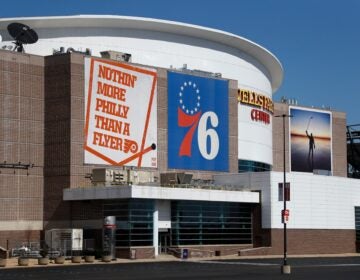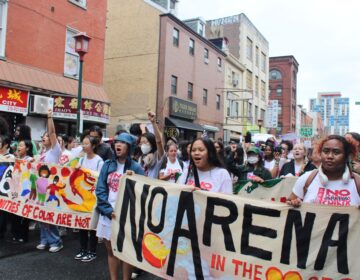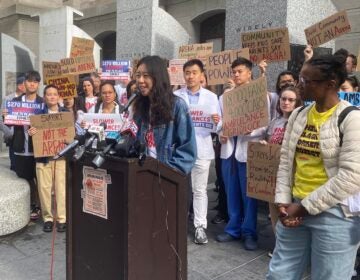Details from Society Hill Foxwoods forum

Oct. 29
By Kellie Patrick Gates
For PlanPhilly
More details about Foxwoods Casino’s proposal to move to The Gallery at Market East and the process through which City Council and officials will consider that proposal emerged at a panel discussion held in Society Hill Tuesday night.
–The Gallery contains about 1.3 million square feet of floor space. Foxwoods is interested in operating within 300,000 square feet on the third floor.
–The casino and the Pennsylvania Real Estate Trust, owners of the Gallery, are still working on their plans for that space.
–It will be at least six months before City Council votes on a Foxwoods plan, Councilman Frank DiCicco told the roughly 70 people who braved the weather to gather at Old Pine Church.
The panel discussion was sponsored by the Society Hill Civic Association. There have been other community meetings during the past few weeks, in Chinatown and Washington Square West. Last night, some familiar faces were present – DiCicco and Deputy Mayor for Commerce and Planning, Andy Altman. But they shared the head table with community activist Helen Gym, a board member of Asian-Americans United, Robert Goodman, economics professor at Hampshire College in Massachusetts, and Les Bernal, executive director of Stop Predatory Gambling and former chief of staff to Massachusetts State Senator Sue Tucker. There was no Foxwoods representative on the panel.
Each panelist was given seven minutes to speak, and then another two minutes to address what other panelists had said. Then the moderator, Rev. Dick Ullman, read questions that had been submitted in writing by the audience, which, judging by applause, was solidly against having a casino at The Gallery.
There were two obvious points of contention during the discussion: Whether or not DiCicco’s introduction of the zoning legislation that would allow Foxwoods to operate at The Gallery was rushing the process, and whether or not it was time to give up on the idea of having no casinos near Philadelphia neighborhoods.
DiCicco and Altman both said they were not there to discuss the pitfalls or merits of gambling, because, like it or not, the state has determined that there will be two casinos in Philadelphia. It was not a matter of if the casinos were coming, only where they would be, and what could be done to make the most of that reality.
“This is the chance to be at the table and figure out if we can negotiate the best deal for Philadelphians,” Altman said.
But Bernal, Goodman, Gym and the audience took issue with this assertion.
Bernal said that around the country, wherever gambling is proposed, “the message is that it’s inevitable.” He asserted that the reason leaders stress this message is that the more that people learn about casinos, the more it becomes obvious that there “is very little merit.”
The gambling industry targets problem gamblers, from whom it makes most of its money, he said. That, and the bigger financial losses of the losers, are what separate casino gambling from more “casual” gambling, such as at-home poker games or church bingo, he said.
Goodman said that state government leaders who approve legalized gambling often say that people are going to gamble no matter what, and they are now losing money to neighboring states that have gambling. But, he said, having gambling in a state creates proximity that leads to more problem gamblers in that state.
Bernal got a resounding round of applause when he suggested that the American way is to challenge leaders to change things that are considered foregone conclusions, such as the former facts that women cannot vote and slavery is legal.
DiCicco pointed out some facts of his own: Governor Ed Rendell, who was re-elected by a landslide, has wanted to bring gambling to Philadelphia since he was mayor. The legislature voted the casinos in four years ago, and the gaming board approved their locations. The State Supreme Court has sided with the casinos and against the city and state leaders who resisted their proposed locations 14 times – despite the fact the city spent “hundreds of thousands of tax dollars” on attorneys. Most recently, the Court ordered the city to give Foxwoods almost all the permits it needs to operate at its originally proposed riverfront location, he said, and he had no doubt that if the city resisted granting the last one, the building permit, either the court appointed Special Master or the justices would order it given.
“We’re going to have two casinos,” he said. “That train left the station.”
Gym, of Asian Americans United, said that DiCicco’s introduction of legislation that would create a zoning classification that would allow gaming along the Market East corridor and place that classification on The Gallery site was a mistake, especially because Foxwoods has yet to submit a detailed proposal.
Asian Americans United members are worried that a casino at The Gallery would increase gambling addiction among residents, take customers from local businesses and cause a quality-of-life decline.
“Why give up zoning rights at this time for something we don’t understand?” she said.
DiCicco said he shares neighborhood residents’ concerns about the possible traffic, parking, societal and economic impact the casino would bring, and that is why he decided to submit the legislation. The Supreme Court gave CED zoning to Foxwoods at its originally proposed site, saying that the city had been intentionally dragging his feet. That decision robbed the city and its citizens of the chance to negotiate with Foxwoods, he said. The legislation requires a detailed and public review process in which all potential problems and ways in which they could be mitigated would be discussed before a final decision is made, DiCicco said.
All of those issues and others must be addressed by Foxwoods as part of its plan of development, Altman said, and the zoning does not go into effect until the plan of development is approved by Council.
“If City Council determines this will not work, then we’ll pull the plug,” DiCicco said.
Gym said the process so far has been frustrating because it feels like Foxwoods has been in the driver’s seat, rather than the city. The Gallery location was proposed by the casino, and she said it would be better if the city appointed a committee to find casino sites that would have the least impact on neighborhoods.
DiCicco said that committees have suggested alternate sites, and that he personally suggested the airport because it was away from neighborhoods – but that proposal went nowhere.
While agreeing with residents that studies are needed to show any potential negative impacts a casino at The Gallery might have, DiCicco and Altman also said there are a host of potential positive impacts for the neighborhood and the city, including the creation of jobs and the potential to bring economic vitality to a corridor that has resisted it for decades – even while the neighborhoods around it flourished. It would be irresponsible, Altman said, not to consider those potential benefits.
The on-going discussion resumes at 10 a.m. Saturday in Council Chambers, when Council’s Committee on the Rules will hold a public hearing on the CED legislation.
Contact the reporter at kelliespatrick@gmail.com
WHYY is your source for fact-based, in-depth journalism and information. As a nonprofit organization, we rely on financial support from readers like you. Please give today.






